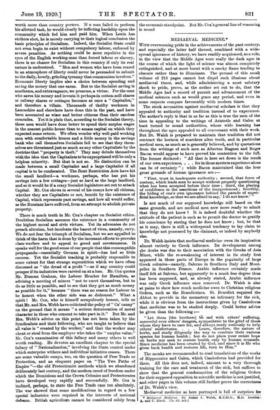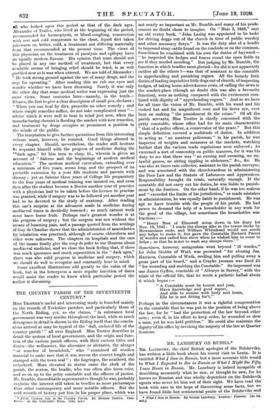MEDIAEVAL MEDICINE.*
WITH overweening pride in the achievements of the past century, and especially the latter half thereof, combined with a wide- spread ignorance of history, we have readily acquiesced, as a rule,
in the view that the Middle Ages were really the dark ages in the course of which the light of science was almost completely extinguished, and at most burnt with a smoky flame tending to obscure rather than to illuminate. The perusal of this small volume of 215 pages cannot but dispel such illusions about mediaeval times, and, while, administering a most salutary shook to pride, prove, as the author set out to do, that the
Middle Ages had a record of pursuit and advancement of the medical sciences such as would grace any period, and even in
some respects compare favourably with modern times.
The stock accusation against mediaeval scholars is that they appealed to authority and tradition instead of to experience.
The author's reply is that in as far as this is true the men of the time in appealing to the writings of Aristotle and Galen at least turned to sound authorities, whose wide learning has throughout the ages appealed to all conversant with their work. But Dr. Walsh is prepared to maintain that tradition did not contract the horizon of searchers after truth, and in particular medical men, as much as is generally believed, and by quotations from the writings of such men as Albertus Magnus and Roger Bacon would appear to have proved his contention to the full The former declared : " All that is here set down is the result of our own experience, . . . for in these matters experience alone can be of certainty " ; while Bacon maintained that the four great grounds of human ignorance are :— " First, trust in inadequate authority ; second, that force of custom, which leads men to accept without properly questioning what has been accepted before their time ; third, the placing of confidence in the assertions of the inexperienced ; fourthly, the hiding of one's own ignorance behind the parade of super- ficial knowledge, so that we are afraid to say,' I do not know.'
Is not much of our supposed knowledge still based on the same grounds, and are medical men now more ready to admit that they do not know ? It is indeed doubtful whether the attitude of the patient is such as to permit the doctor to gratify his conscience by stating that he does not know ; but, be that as it may, there is still a widespread tendency to lay claim to knowledge not possessed by the claimant, or indeed by anybody else.
Dr. Walsh insists that mediaeval medicine owes its inspiration almost entirely to Greek influence. Its development among the Arabs was due to their association with the Greeks of Asia Minor, while the re-awakening of interest in its study first appeared in those parts of Europe in the proximity of large Greek colonies—namely, Salerno in Southern Italy and Mont- pelier in Southern France. Arabic influence certainly made itself felt at Salerno, but apparently to a much less degree than has been supposed, and, as already stated, Arabic influence was only Greek influence once removed. Dr. Walsh is also at pains to show how much medicine owes to Christian religious Orders, such as the Benedictines. St. Benedict required the Abbot to provide in the monastery an infirmary for the sick, while it is obvious from the instructions given by Cassiodorus that medicine was to be studied deeply. Could better advice be given than the following :—
" Let them [the brothers] be sad with others' suffering, sorrowful over others' dangers, sympathetic to the grief of those whom they have to care for, and always ready zealously to help others' misfortunes. . . . Learn, therefore, the nature of herbs, and study diligently the way to combine their various species for human health ; but do not place your entire ho on herbs nor seek to restore health only by human counsels. Since medicine has been created by God, and since it is He who gives back health and restores life, turn to Him."
The monks are recommended to read translations of the works of Hippocrates and Galen, which Cassiodorus had provided for them. All this does not, indeed, amount to a very thorough training for the care and treatment of the sick, but suffices to show that the general condemnation of the religious Orders for their supposed opposition to scientific medicine is not justified, and other pages in this volume still further prove the correctness of Dr. Walsh's view.
Mediaeval medicine as here portrayed is full of surprises for
• Mediaeval Medicine. By James J. Walsh, M.D. London: A. and C. Black. 17s. 6d. net.) all who looked upon this period as that of the dark ages. Alexander of Tralles, who lived at the beginning of the period, recommended for haemoptysis, or blood-coughing, venesection with rest and cold compresses to the chest, liquid diet taken lukewarm or, better, cold, a treatment not differing materially from that recommended at the present time. The views of this physician on the treatment of paralysis and epilepsy have an equally modern flavour. His opinion that trust should not be placed in any one method of treatment, but that every available means of bringing relief should be tried, is as well justified now as it was when uttered. We are told of Alexander : " He took strong ground against the use of many drugs, and the rage for operating." After reading this we rub our eyes and wonder whether we have been dreaming. Surely it was only the other day that some medical writer was expressing just the same views. Some centuries later—namely, in the tenth- Rhazes, the first to give a clear description of small-pox, declares : " When you can heal by diet, prescribe no other remedy ; and where simple remedies suffice, do not take complicated ones "- advice which it were well to bear in mind just now, when the manufacturing chemist is flooding the market with new remedies, and treatment by drugs occupies so prominent a position in the minds of the public.
The temptation to give further quotations from this interesting volume must, however, be resisted. Good things abound in every chapter. Should, nevertheless, the reader still hesitate to acquaint himself with the progress of medicine during the `•dark ages," let him turn to chap. iii., wherein is given an account of " Salerno and the beginnings of modern medical education." The modern medical curriculum, extending over a minimum of five years, seems long, and the prospect of its probable extension by a year fills students and parents with dismay ; yet at Salerno three years of College life preparatory to the four years of medical training was insisted on, and even than after the student became a Doctor another year of practice with a physician had to be taken before the licence to practise was granted, while if surgery was to be followed yet another year had to be devoted to the study of anatomy. After reading this one's surprise at the advances made in medicine during mediaeval times is decidedly lessened ; so much earnest work must have borne fruit. Perhaps one's greatest wonder is at the progress of surgery ; but the surgeon was not without the means of lessening pain, and a passage quoted from the writings of Guy de Chauliac shows that the administration of anaesthetics by inhalation was practised, although of course chloroform and ether were unknown. The chapters on hospitals and the care of the insane finally give the coup de grace to our illusions about mediaeval medicine, and we close the book feeling that, if there was much ignorance and much superstition in the " dark ages," there was also solid progress in medicine and surgery, which we should do well to recognize and constantly bear in mind.
Some excellent illustrations add greatly to the value of the book, but in the letterpress a more regular insertion of dates would assist the reader to know which particular period the author is discussing.







































 Previous page
Previous page